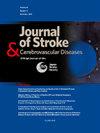替奈普酶延长时间窗治疗急性缺血性卒中的疗效和安全性:一项随机对照试验的最新荟萃分析
IF 1.8
4区 医学
Q3 NEUROSCIENCES
Journal of Stroke & Cerebrovascular Diseases
Pub Date : 2025-05-03
DOI:10.1016/j.jstrokecerebrovasdis.2025.108338
引用次数: 0
摘要
背景:关于tenecteplase (TNK)在标准治疗窗外急性缺血性卒中(AIS)患者中的疗效和安全性的数据有限。本研究旨在评估0.25 mg/kg剂量的TNK在延长时间窗内治疗AIS患者中的作用。方法:截至2025年2月15日,在PubMed、Embase和Cochrane Library中进行检索,包括比较症状发作4.5小时后或醒来后AIS患者TNK (0.25 mg/kg)与未溶栓的随机对照试验(rct)。主要疗效指标包括3个月的良好功能预后(mRS≥1)和良好功能预后(mRS≥2)。评估的次要安全性结果包括症状性颅内出血(sICH)、任何颅内出血和3个月的全因死亡。随机效应模型用于计算汇总估计。结果meta分析共纳入6项随机对照试验(n = 1955例)。合并分析显示,与对照组相比,使用TNK治疗90天的良好功能结果显着改善(OR = 1.35, 95% CI: 1.12至1.64)。两组在良好的功能结局(OR = 1.16, 95% CI: 0.94 ~ 1.44)、全因死亡(OR = 1.11, 95% CI: 0.82 ~ 1.49)、脑出血(OR = 1.79, 95% CI: 0.94 ~ 3.39)和脑出血(OR = 1.21, 95% CI: 0.96 ~ 1.53)方面均无统计学意义的关联。结论AIS患者在较长时间内给予tnk可获得良好的神经系统预后,且具有良好的安全性。本文章由计算机程序翻译,如有差异,请以英文原文为准。
Efficacy and safety of tenecteplase administration in extended time window for acute ischemic stroke: An updated meta-analysis of randomized controlled trials
Background
Data regarding the efficacy and safety of tenecteplase (TNK) in patients with acute ischemic stroke (AIS) who present outside the standard treatment window are limited. This study aims to evaluate the role of TNK at a dose of 0.25 mg/kg, in treating AIS patients in an extended time window.
Methods
Searches were performed up to February 15, 2025 in PubMed, Embase, and Cochrane Library to include randomized-controlled trials (RCTs) comparing TNK (0.25 mg/kg) to no thrombolysis in AIS patients presenting after 4.5 hours of symptom onset or wake-up AIS. The primary efficacy outcomes included a 3-month excellent functional outcome (mRS ⩽1), and a good functional outcome (mRS ⩽2). Secondary safety outcomes assessed included symptomatic intracranial hemorrhage (sICH), any ICH, and 3-month all-cause death. A random-effects model was used to calculate summary estimates.
Results
6 RCTs were included (n = 1,955 patients) in the meta-analysis. The pooled analysis demonstrated a significantly improved excellent functional outcome on 90 days (OR = 1.35, 95 % CI: 1.12 to 1.64) with TNK administration compared to control. No statistically significant association was observed for the two groups regarding good functional outcome (OR = 1.16, 95 % CI: 0.94 to 1.44), all-cause death (OR = 1.11, 95 % CI: 0.82 to 1.49), sICH (OR = 1.79, 95 % CI: 0.94 to 3.39), and any ICH (OR = 1.21, 95 % CI: 0.96 to 1.53).
Conclusion
TNK administration in an extended time window for AIS patients leads to favorable neurological outcomes with a good safety profile.
求助全文
通过发布文献求助,成功后即可免费获取论文全文。
去求助
来源期刊

Journal of Stroke & Cerebrovascular Diseases
Medicine-Surgery
CiteScore
5.00
自引率
4.00%
发文量
583
审稿时长
62 days
期刊介绍:
The Journal of Stroke & Cerebrovascular Diseases publishes original papers on basic and clinical science related to the fields of stroke and cerebrovascular diseases. The Journal also features review articles, controversies, methods and technical notes, selected case reports and other original articles of special nature. Its editorial mission is to focus on prevention and repair of cerebrovascular disease. Clinical papers emphasize medical and surgical aspects of stroke, clinical trials and design, epidemiology, stroke care delivery systems and outcomes, imaging sciences and rehabilitation of stroke. The Journal will be of special interest to specialists involved in caring for patients with cerebrovascular disease, including neurologists, neurosurgeons and cardiologists.
 求助内容:
求助内容: 应助结果提醒方式:
应助结果提醒方式:


